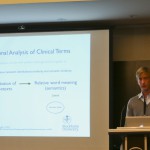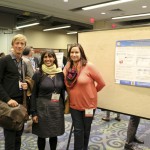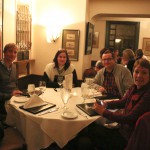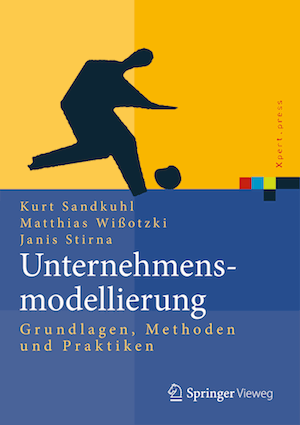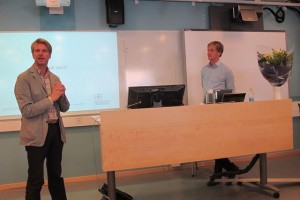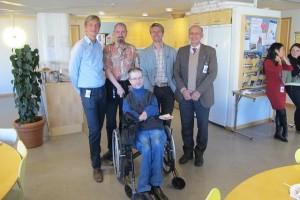The Nordic Information for Action e-Science Center of Excellence (see photo of group) had a Kick-off at Karolinska Institutet January 17, where all team leaders met and scheduled some of the activities for the coming 5 years.
NIASC will organize and fund PhD- and Post doc positions as well as PhD training school within E-sciences in the Nordic countries and to perform research within biobanks, health data registries, cancer screening and data and text mining for prediction of cancer.
Mia Kvist, Henrik Boström, Claudia Ehrentraut and I where on the Kick-off from DSV.
Symposium on Languages in Biology and Medicine (LBM 2013)
I attended the 5th international symposium on Languages in Biology and Medicine (LBM 2013), held at Tokyo University. There, I presented the paper “Vocabulary Expansion by Semantic Extraction of Medical Terms” by Maria Skeppstedt, Magnus Ahltorp and Aron Henriksson. The paper was a result of the work conducted during my internship at the Language Media Lab at Hokkaido University, but with important additional contributions from Magnus and Aron. The paper was about automatic extraction of terms for expressing Medical Findings and Pharmaceutical Drugs from the Swedish journal Läkartidningen. The slides for the presentation can be found here.
There were many presentations related to the research conducted by our Clinical Text Mining Group at DSV. Sampo Pyysalo presented a paper (“Distributional Semantics Resources for Biomedical Text Processing”) in which the performance of a named entity recogniser was enhanced using features in form of clustered vectors from a word space constructed by the neural networks-based word2vec package. The study also made use of a word space constructed with Martin Duneld’s random indexing package. Sampo also gave a high-light talk of another study (which later will be published in BMC Bioinformatics) in which named entity recognition of mentions of anatomical structures was enhanced by features based on cluster membership in clusters constructed through Brown’s clustering. Mizuki Morita presented a comparison between influenza monitoring through Google search terms and through an SVM classifier of Twitter searches, Alicia Pérez presented a rule- and key-word-based approach for Spanish ICD-9 coding and Juan Antonio Lossio Ventura presented key-word extraction using the C-value method. A study by Hyunju Lee on a gene search engine, showed the results of the searches by colour coding relevant entities in the retrieved journal abstracts. Kevin Cohen presented a study on how features from topic modelling can be used for improving assertion classification. There was also a keynote speech on the Japanese KEGG database, which contains pharmaceutical drug-related information.
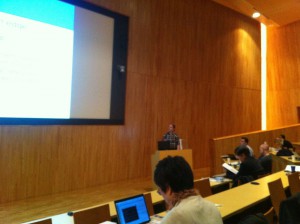
The symposium was held in a very beautiful lecture hall at Tokyo University. Here Kai Hakala from Turku University, who was awarded best paper for “Hypothesis Generation in Large-Scale Event Networks”, presents.
Annual Symposium of the American Medical Informatics Association (AMIA 2013) in Washington DC
Sumithra Velupillai and Aron Henriksson attended the Annual Symposium of the American Medical Informatics Association (AMIA) in Washington DC (Nov. 17-20). The AMIA symposium is the main medical informatics event in the US, with participants from all states, and around the world, with participants from all continents – there were well over 2,000 participants in total. The symposium thus provided a good overview of current challenges and ongoing research in the world of medical informatics, as well as a great opportunity for networking. Aron presented a paper, Identifying Synonymy between SNOMED Clinical Terms of Varying Length Using Distributional Analysis of Electronic Health Records, co-authored with Mike Conway (UCSD), Martin Duneld (DSV, SU) and Wendy Chapman (University of Utah). We also had a nice reunion dinner with participants in the Interlock project, a two-year (2011-2013) collaboration between Stockholm University and University of California, San Diego.
- Aron presented a paper in one of the sessions
- Aron, Sumithra and Danielle at one of the poster sessions
- AMIA 2013 poster session
- Interlock reunion dinner
Louhi 2014 workshop organized by the Clinical Text Mining group DSV
The Louhi 2014 – The Fifth International Workshop on Health Text Mining and Information Analysis workshop is organized by the Clinical Text Mining group, DSV. It will take place at EACL-2014 Gothenbourg, april 27, 2014,
EACL 2014, the 14th Conference of the European Chapter of the Association for Computational Linguistics is the largest conference in computational linguistics in Europe.
New book in German on Enterprise Modeling
Kurt Sandkuhl, Matthias Wißotzki, Janis Stirna, Unternehmensmodellierung: Grundlagen, Methode und Praktiken, Springer, 2013, ISBN 978-3-642-31093-5, available on SpringerLink
Aron Henriksson’s Licentiate Dissertation Defense
Aron Henriksson convincingly defended his Licentiate thesis on October 18, 2013. The thesis, with the title Semantic Spaces of Clinical Text – Leveraging Distributional Semantics for Natural Language Processing of Electronic Health Records, investigates the applicability and utility of distributional semantics to facilitate information extraction from electronic health records. This was demonstrated in several use-cases; finding synonyms, identifying and explaining abbreviations, detecting adverse reactions to medication, and assigning clinical codes to texts. The mined health records were written in Swedish and, in one instance, in English.
Professor Jussi Karlgren from KTH conducted the opposition. Given his extensive hands-on experience with the aforementioned techniques in other domains, both as a researcher at SICS and as a founder of the company Gavagai, Jussi led a very interesting discussion with the respondent. The opponent and the examiner had many good things to say about the thesis. The examiner from DSV was Professor Paul Johannesson. Aron’s advisors are Dr Martin Duneld and Professor Hercules Dalianis, who will continue to work with Aron in his future research studies.
Congratulations!
Call for chapters to the book entitled “Modern Techniques for Successful IT Project Management”
Here is a call for chapters to the book entitled “Modern Techniques for Successful IT Project Management” (Editors: Shang Gao and Lazar Rusu) scheduled to be published by IGI Global in 2014. The book objective is to brings together the latest academic research and professional practice, covering aspects related to modern techniques for successful IT project management.
Recommended topics include, but are not limited to, the following:
- Virtual project management
- Agile project management
- Project success
- Risk management
- Outsourcing or distributed projects
- Project management methodologies
- Project quality metrics or standards
- IT project governance
- Project controlling practices
- Best practices in IT outsourced projects
- Relationships in IT outsourced projects
- Project lifecycle management
- Modeling approach for IT project management
- Managing IT outsourced projects
- Coordination of IT projects
- Theories used in IT project management
- Pedagogical issues on modern techniques for IT project management
Important Dates:
December 15, 2013: Proposal Submission Deadline
January 15, 2014: Notification of Acceptance
February 28, 2014: Full Chapter Submission
April 30, 2014: Review Results Returned
June 15, 2014: Final Chapter Submission
July 15, 2014: Final Deadline
For more information about this call for chapters please access the following link: http://www.igi-global.com/publish/call-for-papers/call-details/1100
Claudia Ehrentraut – new employee
Hi!
Even though it has been a month since I started working here, I would like to take this opportunity to introduce myself to everyone at DSV. I am working as a research engineer in the Clinical Text Mining Group led by Hercules Dalianis. My current research covers Language Technology and Health Informatics in general and the Detection of Hospital Acquired Infections in particular.
My background is in Language Technology and Linguistics. I obtained a Bachelor’s degree in Nordic Languages and Anthropology from the University of Freiburg and continued to study the Master’s program in Language Technology at Uppsala University, which I completed in spring 2013. I wrote my Master’s thesis at DSV, focusing on the detection of Hospital Acquired Infections in Swedish patient records using machine learning. My current work pursues the objective to optimize the initial results by applying new preprocessing methods and using a larger dataset.
I am looking forward to working with you and meeting everyone who I haven’t had the chance to talk to yet.
Claudia

